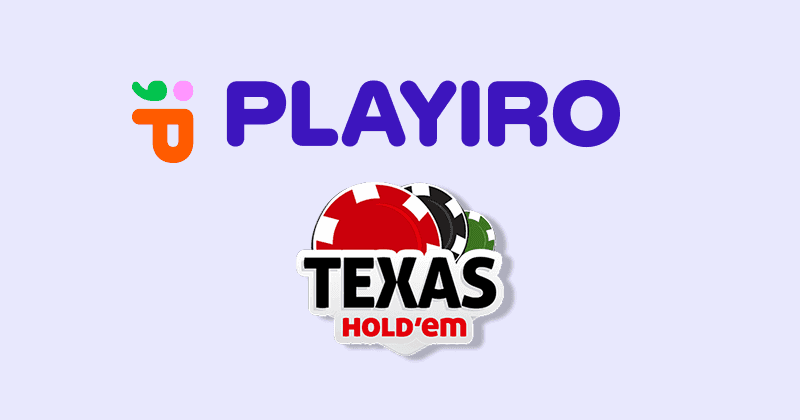
Texas Hold’em Rules
Playiro has created a complete Texas Hold’em rules guide – from setup and gameplay to strategies, hand rankings, and hosting your own poker night.
Created By Adam Davis Fernsby
How to Play Texas Hold’em Poker
Texas Hold’em is the world’s most popular form of poker. It is easy to learn, yet endlessly deep. Players combine two private hole cards with five shared community cards to make the best five-card hand.
Preparations
- Players: 2–10
- Deck: Standard 52-card deck
- Chips or cash to wager
- Dealer button rotates clockwise each hand
Blinds
- The two players left of the dealer post forced bets:
- Small Blind (left of dealer)
- Big Blind (left of small blind)
- This ensures there’s always money in play.
Gameplay
Texas Hold’em is played over four betting rounds with five community cards.
1. Hole Cards
- Each player gets two face-down hole cards.
- Betting starts with the player left of the big blind.
2. The Flop
- Three community cards are dealt face-up.
- Another round of betting begins (starting with the small blind or next active player).
3. The Turn
- A fourth community card is dealt face-up.
- Another betting round follows.
4. The River
- The fifth and final community card is dealt.
- One last round of betting occurs.
5. The Showdown
- Remaining players reveal hands.
- The best five-card poker hand wins the pot.
Players can use any combination of their two hole cards and the five community cards (even just the board).
How to Win
- Have the best hand at showdown, or
- Force all opponents to fold during betting
In tournaments, you win by collecting all chips. In cash games, each pot is its own victory.
Texas Hold’em Basic Strategies
There is not enough room on this page to cover the complete strategies there are in this game, but here are some basic ones:
Start With Strong Hands
- Premium hands to raise: AA, KK, QQ, AK, JJ
- Playable late position: AQ, AJ, TT, suited connectors (9♦10♦)
- Fold weak offsuit or low unpaired hands
- Golden rule: If unsure, fold more often than not.
Stack Management
- Tournaments:
- Big stack (40+ BBs): Play aggressive, pressure short stacks
- Medium stack (15–40 BBs): Be selective, avoid marginal spots
- Short stack (<15 BBs): Push-or-fold mode
- Cash games:
- Focus on value betting
- Avoid big risks on marginal draws
- Reload when you fall below your comfort stack size
(BB = Big Blind)
Bet Sizing Fundamentals
Pre-Flop:
- Standard open: 2.5–3x the big blind
- If others limp: raise 4–5x to punish
Post-Flop:
- C-bet ~50–70% of the pot
- Bet bigger (60–80%) on draw-heavy boards
- Bet smaller (30–50%) on dry boards
Position is Power
- Early position (UTG): Play tight, strong hands only
- Late position (Cutoff/Button): Play wider, steal blinds
- Button: Most profitable because it acts last
Chip Stack Maintenance
- Don’t defend blinds with trash – you’ll be out of position.
- Control the pot with medium-strength hands.
- Rebuy when low in cash games.
Reading Players
- Tight players → bluff more
- Loose players → tighten up, value bet more
- Aggressive players → trap them with strong hands
- Watch betting patterns, timing tells, and table talk
Texas Hold’em Hand Rankings
| Rank | Hand | Description |
|---|---|---|
| 1 | Royal Flush | A-K-Q-J-10, all same suit |
| 2 | Straight Flush | Five in sequence, same suit |
| 3 | Four of a Kind | Four cards of the same rank |
| 4 | Full House | Three of a kind + a pair |
| 5 | Flush | Five same-suit cards, any order |
| 6 | Straight | Five in sequence, mixed suits |
| 7 | Three of a Kind | Three cards of the same rank |
| 8 | Two Pair | Two different pairs |
| 9 | One Pair | Two cards of the same rank |
| 10 | High Card | Highest card if no other combo |
Hosting a Home Texas Hold’em Game
You can very easily host your own game with friends at home. Here is what you need:
What You Need
- 1–2 decks of cards
- Poker chips (500+ for 6–8 players)
- Dealer, small blind, big blind markers
- Table space for community cards
Tournament Setup
- Starting stacks: 5,000 or 10,000 chips
- Blinds: Start 25/50 or 50/100
- Increase every 15–20 minutes (e.g. 25/50 → 50/100 → 100/200 …)
Cash Game Setup
- Chips represent real money (e.g. $0.05/$0.10 blinds)
- Min buy-in: 40 BBs | Max buy-in: 100 BBs
- Players can join/leave anytime
House Rules
- No Limit is standard
- Decide how to settle disputes
- Rotate dealing or appoint one dealer
Overview of the Rules
- 2 hole cards + 5 shared = best 5-card poker hand
- Four betting rounds: Pre-Flop, Flop, Turn, River
- Blinds rotate clockwise each hand
- On your turn: check, bet, call, raise, or fold
- Best hand wins unless all others fold first



